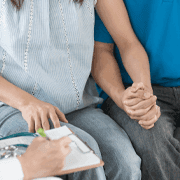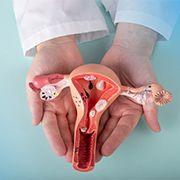Herpes on Buttocks: Identification and Management Tips
In This Article
Herpes on Buttocks: Identification and Management Tips
Ashitha Kareem
Updated on March 01, 2024
Medically verified by Dr. Arya
Fact checked by Dr. Pournami

Wellness
7 min read
Karepedia is here to break down everything into easy-to-understand bits so you can feel more confident and informed about managing herpes.
Whether you're looking out for yourself or someone you care about, this guide aims to provide practical advice and useful information to help live life to the fullest, even with herpes.
Let's dive in and learn how to handle this condition.
What Is Herpes?
First let’s understand what herpes is. Herpes Simplex Virus (HSV) generally known as herpes is a common sexually transmitted infection (STI). Herpes is a common and mild infection which can be spread from any sexually active person.
HSV Types
There are two types of HSV infections, HSV type 1(HSV-1) and HSV type 2 (HSV-2).
| Type of HSV* | **Estimated number of people affected** | **Age Group** | **Percentage** | *Common Symptoms |
| ---------------- | ---------------------------------------- | -------------- | ---------- | ----------------------- |
| HSV-1 | 3.7 billion | Under 50 years | 67% | Majorly Oral Herpes: cause cold sores, called fever blisters on or around your mouth | It usually pops up during times of stress or lack of sleep. |
| HSV-2 | 491 million | 15 years – 49 years | 13% | Majorly Genital Herpes: cause development of extra genital lesions e.g. buttocks, thighs, finger or eye |
As per the latest data, women have twice as many possibilities of affecting HSV-2.It is because sexual transmission is most efficient from men to women.
Identifying the Symptoms of Herpes on Your Buttocks
The symptoms of herpes are usually mild and may, in most cases, go unnoticed. In some cases people mistake the symptoms for another condition.
- The symptoms of herpes may take a few days to a week to appear.
- The earliest symptom is redness and may feel itching, burning or tingling on the affected area followed by small painful bumps.
- Over time, these bumps will develop into fluid-filled blisters that burst to form shallow skin ulcers. The ulcers then crust over which gradually heals in roughly four to six days.
- Outbreaks of oral herpes can last for two to three weeks, which can be shorter than the two to six weeks of a genital herpes outbreak.
Other episodic symptoms are:
- Pain and itching in the buttocks
- Fever and headache
- Body ache
- Swollen lymph
Repeated outbreaks (recurrences) are usually shorter and less severe.
Asymptomatic Shedding
Research shows the awake and active virus may be without any symptoms or signs. There may be no itch, no pain, no pimples, and no blisters. This phenomenon is called asymptomatic shedding (asymptomatic reactivation or subclinical shedding).
There is a chance for the presence of the virus even at time of asymptomatic shedding.
It also applies when :
1. Some lesions are failed to notice
2. Some lesions are small and subtle. Hence, it cannot be noticed even by healthcare providers
3. Some lesions are mistaken as regular rash, pimples or ingrown hairs
It is important to know that even without visible symptoms herpes can spread. Hence, it is important to always be careful when having intimate contact with herpes.
There are no documented cases of a person getting genital herpes from an inanimate object such as a toilet seat, bathtub, or towel. Herpes is a very fragile virus and does not live long on surfaces.
Outbreak Frequencies
The number of outbreak frequencies depends on the immune system strength. It can vary with physical and psychological factors. Hence, it is said that the frequency can be reduced by proper emotional stress management.
Usually there are more outbreaks during the first year. The recurrences are less severe and less frequent.
Herpes triggers are highly individual. With time you will become adjusted to it and can recognise, avoid and understand the factors that awaken the virus.
Transmission of Herpes
Here’s all you need to know about transmission of herpes.
- Herpes is transmitted through direct skin-to-skin contact.
Most skin on the body is too thick a barrier for viruses to get in. It gets into the body when a contagious area comes into contact with a tiny break in skin or mucous membrane tissue.
- Herpes family shows a trait called latency, where there is a time gap between the periods of onset of a stimulus and a peak of ensuing action potential. They have a way of creating small but permanent colonies inside the body.
Once entering the body it will stay in the body for a lifetime, but mostly in a state of inactivity.
- In favourable conditions, the virus makes copies of itself and spreads
- When the immune system begins to react, they hide along nerve pathways.
- Basically, the virus returns to safe spots and sleeps. Sometimes for a larger period of time. Unfortunately, some biological factors trigger the early onsets of symptoms.
 10mint
10mintSexual Health Matters: How To Maintain Your Sexual Health ?
 10mint
10mintYour Guide to Sexual Health Screening and Preventive Measures
 10 mints
10 mintsSTDs in Women: Comprehensive Guide on Symptoms and Treatments
Get a Callback Now
Triggers of Herpes
- Illness or fever
- -Sun exposure
- Menstrual period
- Injury
- Emotional stress
- -Surgery
- Steroidal medications such as for asthma, etc
Causes of Herpes
Curious to know what causes Herpes? Here you go.
Lack of Barrier Protection: Herpes are transmitted by having sex without using barriers or sharing sex toys.
Vertical Transmission: Passed from mother to child during pregnancy or childbirth, or babies may be infected shortly after birth.
Blood Donations: Herpes can be spread due to blood donation.
Infected Body Fluids: Herpes can be spread from contact with genital sores or body secretions.
Weakened Immune Systems: Weak Immune systems are the main cause of STIs.
Asymptomatic shedding: A person can be exposed to the virus and pass it to others without visible symptoms. The reason for this is the existence of viruses in genital fluids even without any ulcers.
Diagnosing Herpes
There are different tests available for herpes. The best time for diagnosis is during the time of an outbreak. This will help in reducing the possibility of false results.
- Blood Tests are available for people with no symptoms or after healing. It detects the antibodies instead of the virus itself.
- Swab testing can be done to detect viruses during active herpes.
- Culture can easily miss infections and give false negative results if the lesions are small or have already begun to heal.
- Nucleic Acid Amplification Testing (NAAT) is more sensitive. NAAT methods are the preferred method, with PCR as the most-widely used NAAT method. These tests are fast, accurate. There is also less chance of a false negative result with NAATs.
Who should get tested?
People with any other sexually transmitted infection including Chlamydia, Human Papillomavirus (HPV), etc.
People in a relationship with a herpes-positive partner, especially if you are a pregnant woman or plan to become pregnant.
Any person who asks to be tested.
HIV and HVS
We now know everything about Herpes .Now let us know if there is any relation between the most commonly known HIV and Herpes.
It is easier for a person with genital herpes to get or transmit HIV Infection. How?
Both HIV and Herpes attack the immunity of our body. Thus people will be prone to more infections,
There is an estimated three fold increased risk of acquiring HIV, if individuals with genital herpes infection are genitally exposed to HIV.
Additionally, people with both HIV and HSV-2 infection are more likely to spread HIV to others. HSV-2 infection is among the most common infections in people living with HIV.
Treating Herpes
Even though herpes is incurable, medicines can shorten the duration and severity of the symptoms.
To significantly lessen the duration of an outbreak, start treatment within 24 hours of initial symptoms, for example as soon as the tingling begins.
Treatment of recurrent episodes is most effective when treated within 48 hours from the appearance of symptoms.
Treatment of Herpes includes:
Antiviral Medications (in pills) approved by the Food and Drug Administration (FDA) are acyclovir, valacyclovir and famciclovir.
There are two kinds of treatment regimens-episodic therapy and suppressive therapy. It helps by attacking the ability of viruses to multiply. It can be used as suppressive in healing during recurrences.
- Pain relievers such as ibuprofen or acetaminophen
- Antiviral creams to relieve itching including penciclovir or docosanol
- Bathing in warm salt water or soaking in warm sitz bath
- Wearing loose fitting clothes
- Applying aloe-vera or petroleum jelly and
- -Maintaining personal hygiene
If you suspect you have genital herpes, or any other STI, see your healthcare provider. Always consult a doctor before taking any medications.
Preventing Herpes
Here are some common hacks that can help you keep herpes at an arm’s length
- Safe Sex Practices: Consistent and proper usage of condoms and dental dams during sexual contact can reduce the risk of transmitting herpes.
- Regular Testing: Tracking health status of both the partners regularly can help to understand potential risks.
- Avoiding Multiple sex partners: The most effective way to prevent STDs is by having a single sexual partner.
- Communication: Open and honest communication is not an embarrassment. The partner should be aware about the potential risk and status.
- Avoid Contact during Outbreak: It minimises the potential risk of transmission.
- Medication and Personal hygiene: It can be assumed that personal hygiene not only lessens the severity of the disease but also plays an important role in preventing transmission of herpes other than by sexual intercourse (e.g., from sores, body fluid).
Herpes on Buttocks At A Glance
Signs & Symptoms
- Painful sores or blisters on the buttocks.
- Itching, burning, or tingling sensation in the affected area.
- Redness and inflammation around the lesions.
- Formation of small, fluid-filled vesicles.
- Ulcers or open sores as the blisters rupture.
Diagnosis
- Clinical examination based on the appearance of lesions.
- Viral culture or polymerase chain reaction (PCR) testing.
- Blood tests to detect herpes antibodies (HSV serology).
Treatment
- Antiviral medications (e.g., acyclovir, valacyclovir).
- Pain relievers to alleviate discomfort (e.g., acetaminophen).
- Topical antiviral creams for localized relief.
- Warm baths with Epsom salts for soothing effects.
Management
- Avoiding sexual contact during outbreaks.
- Keeping the affected area clean and dry.
- Wearing loose-fitting clothing to prevent irritation.
- Using topical creams or ointments recommended by a doctor.
- Informing sexual partners to prevent transmission.
- Seeking medical advice promptly for recurrent outbreaks.
Given STIs are incurable, we can live with herpes without affecting our life. This is possible with appropriate diagnostic tools, management of infection, prevention of transmission and appropriate counselling.
Hope this article helps you understand more about herpes. Knowing and accepting it can help you lead a normal life.
Always consult a doctor before treating symptoms yourself.
Herpes or HVSs are common and contagious diseases, which may cause oral herpes or genital herpes.
Symptoms include blisters, lesions, fatigue, itchiness, fever etc.
Causes of transmission include direct contact, through body fluids, pregnancy and childbirth etc.
Prevention using prioritising personal hygiene, single sex partner, extra care during outbreak etc.
Diagnosis of herpes is done by blood test and swabs from the infected mucus.
HVS patients are highly communicable in spreading HIV.
Source Links
World Health Organization
Harvard Medical School
American Sexual Health Association
medicalnewstoday
Mayoclinic
Centers for Disease Control and prevention
University of Washington Virology Research Clinic

